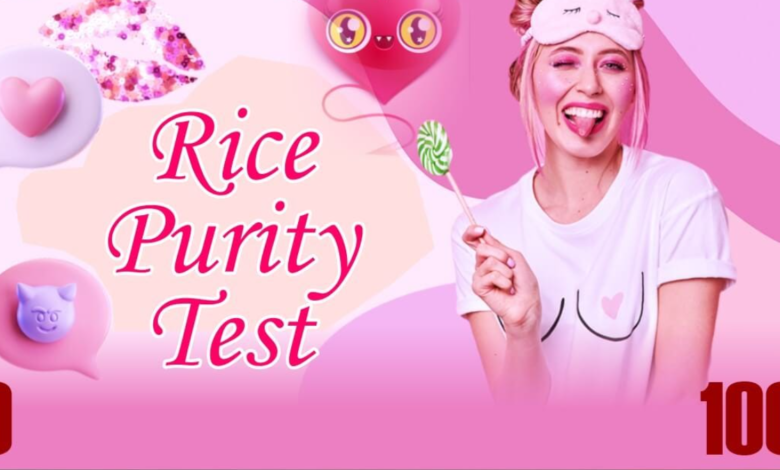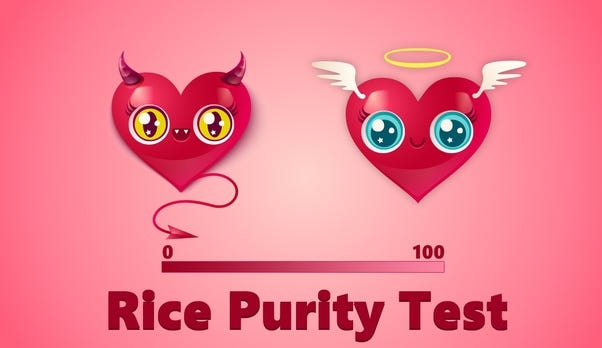Rice Purity Score: Everything You Need to Know

Discover the meaning, history, and cultural impact of the rice purity score. Explore its role in student life, how it’s used today, and FAQs that clear up all your questions.
Introduction to the Rice Purity Score
The rice purity score has become one of those internet phenomena that almost everyone has stumbled upon at some point. It’s not just a test; it’s more like a rite of passage for students, especially in college environments. People often gather around, laugh about their scores, and compare answers as if it’s a badge of honor or a scarlet letter. But what exactly is this score, and why has it stayed relevant for so many years?
At its core, the rice purity score is a questionnaire designed to assess your life experiences, habits, and actions, ranging from the most innocent to the more adventurous. It’s often taken in a lighthearted way, yet it sparks surprisingly deep conversations about lifestyle, personal boundaries, and even social norms. Whether you’ve scored high and claim your purity proudly, or scored low and joke about your wild side, this quiz somehow always finds a way to be part of student culture.
The Origins of the Rice Purity Score
The rice purity score wasn’t created by some faceless internet algorithm. Instead, it was born at Rice University as a way for new students to bond and learn more about themselves and others. The test originally served as an informal introduction to college life, with students filling out the questionnaire and then comparing results.
Over time, it spread beyond the university and made its way into the broader college community. Its appeal lies in its mix of humor, curiosity, and a bit of taboo. Students use it not only to gauge experiences but also as a conversation starter, a group bonding activity, and sometimes even a challenge. Even though the questions may feel dated or quirky, the concept has stood the test of time because it taps into something universal: curiosity about how our experiences stack up against others.
What the Rice Purity Score Actually Measures
The rice purity score measures, in a very casual way, the level of innocence or “purity” in a person’s life. It includes questions about relationships, social behavior, partying, and other personal experiences. The test isn’t meant to be taken as a serious evaluation; rather, it’s more like a playful reflection of what someone has or hasn’t done.
Scoring high typically means you’ve had fewer experiences in the categories mentioned. Scoring low suggests you’ve lived through more adventurous or unconventional moments. While some people interpret the score as a sign of being “too innocent” or “too wild,” the real value of the quiz lies in the conversations it sparks. People learn a lot about their friends, laugh at the awkwardness, and sometimes even reflect on their own boundaries.
Why the Rice Purity Score Became Popular Online
The internet thrives on quizzes, memes, and trends, and the rice purity score fits perfectly into that culture. Once it left the halls of Rice University, it quickly became a viral sensation because of its relatability and entertainment value. People are naturally curious about themselves, and when you combine that curiosity with a touch of humor, it becomes a recipe for virality.
Online platforms such as Reddit, TikTok, and Instagram amplified its popularity by making the score-sharing process public. Suddenly, it wasn’t just about what you and your friends scored; it became about what entire communities thought of different ranges of scores. That shift transformed the test from a niche student tradition to a mainstream cultural talking point.
Taking the Rice Purity Score Test Today
If you’re curious about your rice purity score today, the test is available all over the internet. While different versions exist, most stick to the original question list. The process is simple: you read each question, check off the things you’ve done, and submit the results to get your score.
One of the most important things to remember is that the test is meant to be fun. It doesn’t define you, it doesn’t predict your future, and it certainly doesn’t capture your full personality. It’s simply a questionnaire designed to make you think, laugh, and maybe bond with friends. That said, many people take it surprisingly seriously, analyzing their results as if they reveal something profound about their identity.
The Social Dynamics of the Rice Purity Score
A major reason the rice purity score holds such cultural weight is because of how it’s used in group settings. In dorm rooms, parties, or study groups, someone inevitably brings it up, and soon enough, a whole circle of people is comparing their scores. The collective laughter, teasing, and sometimes even debates make the quiz more about community than about individual numbers.
It can also highlight the diversity of experiences among peers. One person might be shocked at how low their friend’s score is, while another might feel reassured that they’re not the only one who hasn’t done certain things. These dynamics make the quiz an ongoing social tool, bridging gaps in conversations that might otherwise never happen.
Is the Rice Purity Score Accurate?
Accuracy is a tricky word when it comes to the rice purity score. On one hand, it does record your life experiences in a yes-or-no way. On the other, it oversimplifies complex human behaviors into a binary checklist. Real life isn’t that black and white, and reducing someone’s personality or values to a single number doesn’t capture the full picture.
However, the test doesn’t really aim for accuracy. Its purpose is entertainment, reflection, and sometimes a bit of self-discovery. If you treat it as a serious psychological tool, you’ll be disappointed. But if you approach it with the mindset of curiosity and humor, you’ll find that it fulfills its role perfectly.
The Role of the Rice Purity Score in Student Life
For many students, the rice purity score serves as more than just a passing trend. It has become a shared cultural ritual, almost like an unofficial part of orientation week. Students take the quiz together, share their scores, and in doing so, create an instant sense of camaraderie.
This shared ritual can also break down social barriers. It creates an environment where people can talk openly about topics that might otherwise feel awkward. Whether someone is joking about their “shockingly low” score or blushing about their “innocently high” one, the rice purity score provides a framework for open conversation.
Rice Purity Score and Self-Perception

Taking the rice purity score can sometimes lead to introspection. For those who score high, it may raise questions about whether they’re too cautious or missing out on life experiences. For those who score low, it might spark thoughts about whether they’ve been too reckless or adventurous.
The truth, however, is that the score doesn’t define your worth or dictate what kind of person you are. Everyone’s path is different, and the score is just a playful reflection of a few life events. It’s best to see it as a lighthearted snapshot rather than a serious evaluation of character.
Table: Understanding Rice Purity Score Ranges
| Score Range | General Interpretation | Common Perception |
|---|---|---|
| 90–100 | Very high purity | Seen as innocent, cautious, reserved |
| 70–89 | Moderately pure | Balanced, careful but open to experiences |
| 40–69 | Average range | Typical student life experiences |
| 20–39 | Lower purity | Considered adventurous or bold |
| 0–19 | Very low purity | Seen as highly experienced, risk-taking |
Common Misconceptions About the Rice Purity Score
One big misconception is that the rice purity score is a test of morality. People often mistake a high score as being “good” and a low score as being “bad.” In reality, it’s simply a reflection of different life experiences, none of which inherently determine a person’s values or character.
Another misconception is that the test is only relevant for students. While it started in student circles, many people outside of college enjoy taking it as well. In fact, it has become popular among a wide range of age groups, showing that curiosity about life experiences isn’t limited to campus life.
Quotes About the Rice Purity Score
“The rice purity score isn’t a judgment; it’s just a conversation starter.”
“Whether you score high or low, what matters most is that you had fun taking it.”
“The rice purity score is less about numbers and more about the laughter it brings.”
FAQs About the Rice Purity Score
What is the rice purity score?
The rice purity score is a questionnaire originally created at Rice University to measure life experiences, ranging from innocent to adventurous.
Is the rice purity score serious?
No, it’s a lighthearted quiz meant for fun and social bonding, not a scientific or moral evaluation.
What does a high rice purity score mean?
A high score generally means fewer life experiences, often associated with innocence or cautiousness.
What does a low rice purity score mean?
A low score usually indicates a wide range of experiences, often associated with adventurousness.
Can the rice purity score change over time?
Yes, since it’s based on experiences, your score can shift as you go through different stages of life.
Do employers or schools look at the rice purity score?
Absolutely not. It’s just an informal test meant for entertainment.
Conclusion
The rice purity score remains one of the most enduring and entertaining cultural artifacts from student life. While it shouldn’t be taken as a measure of morality or identity, it continues to spark laughter, bonding, and even a little self-reflection. Whether your score is high, low, or somewhere in between, remember that it’s just a playful number, not a definition of who you are.





